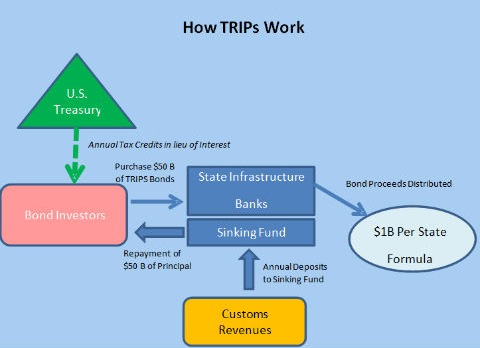Looking to leverage private investment and an untapped market for tax credit bonding to rebuild America’s transportation infrastructure, U.S. Senators Ron Wyden (D-Ore.), John Hoeven (R-N.D.) and Mark Begich (D-Alaska) have introduced legislation to create a tax credit bond program dedicated to transportation infrastructure. Transportation and Regional Infrastructure Project bonds or TRIPs will be a financing tool to fund the rebuilding of the nation’s crumbling transportation infrastructure.
Background
Transportation and Regional Infrastructure Project Bonds (TRIPs) will provide $50 billion in new transportation infrastructure funding through a one-time bonding program and will empower states and local governments to complete significant new projects across all modes of transportation including roads, bridges, transit, rail, and waterways. These funds will generate significant economic growth, improve transportation infrastructure and save lives through enhanced transportation safety without a tax increase. The mechanism would make available $50 billion in infrastructure funding at an estimated scored cost of $12.3 billion (JCT score of tax credits over 2011-2021).
How TRIP Bonds Work

The legislation, drafted to be part of a long-term transportation reauthorization, will allow State Infrastructure Banks (entities authorized by the NHS Act of 1995, TEA-21, and SAFETEA-LU) to issue $50 billion in bonds over a six year period. The proceeds of the bonds will be used to fund the construction of significant new projects across all modes of transportation including roads, bridges, transit, rail, and waterways.
An annual amount of approximately $900 million from customs user fees will be placed in a TRIP Bond Trust Account and invested for the life of the bonds (30 years) which will generate more than enough to repay the entire $50 billion principal amount. That means the only additional cost to the government is the “interest portion” on the bonds, which is in the form of tax credits. In lieu of interest, the bond holders will receive tax credits that can be applied against the holders’ federal income tax liability. After all of the bonds have been issued, the annual cost of the tax credits is estimated to be less than $2 billion.
Each state infrastructure bank will be authorized to issue $1 billion over six years for project in their state, and they may combine to work together on larger projects of regional and national significance.
Read the full report (wyden.senate.gov): Transportation and Regional Infrastructure Project Bonds
Read the full bill text (PDF): Transportation and Regional Infrastructure Project (TRIP) Bonds
About Senator Ron Wyden (D-Ore)
http://wyden.senate.gov/ron/
“Ron Wyden has been standing up for Oregon in the U.S. Senate since 1996. Throughout his public service, Senator Wyden has earned a reputation as an independent voice for Oregonians and the nation, offering creative, common-sense solutions on issues that make a real difference in people’s lives.”
About Senator John Hoeven (R-N.D.)
http://hoeven.senate.gov/public/
“As Governor, Hoeven worked to build North Dakota’s future by focusing on six pillars of growth: education, economic development, agriculture, energy, technology and quality of life. Under his leadership, North Dakota expanded and diversified its economy and gained nearly 40,000 new jobs. North Dakota’s wages and personal income continue to grow faster than the national average, and in recent years, the state led the nation in export growth. While much of the nation is struggling through a recession and budget deficits, North Dakota has balanced its budget, set aside more than $1 billion in reserves for the future, cut taxes, and invested in priorities like education, health care, strong law enforcement, and quality infrastructure.”
About Mark Begich (D-Alaska)
http://begich.senate.gov/public/
“Already in his short time in the Senate, Senator Begich has risen to key positions for Alaska. He was recently named chairman of the Commerce Committee’s Subcommittee on Oceans, Atmosphere, Fisheries and Coast Guard, which has broad jurisdiction over important Alaska issues. He works on behalf of Alaska’s servicemen and women on the Armed Services Committee and also is a member of the Veterans, Homeland Security and Budget committees.”
Tags: Alaska, North Dakota, Oregon, Senator John Joeven, Senator Mark Begich, Senator Ron Wyden, Transportation and Regional Infrastructure Project Bonds, TRIP






 RSS Feed
RSS Feed